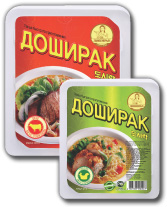Yakult Dominates Russia¡¯s Ramen Market
Company¡¯s ¡°doshirak¡± brand ramen packs are most popular food on Trans-Siberian Railroad
 The Trans-Siberian Railroad, connecting Russia¡¯s easternmost city of Vladivostok and Moscow, extends for 9,300 km and is nicknamed the ¡°Iron Silk Road¡± by the people due to the critical role it plays in transporting goods and people from Asia to Europe.
The Trans-Siberian Railroad, connecting Russia¡¯s easternmost city of Vladivostok and Moscow, extends for 9,300 km and is nicknamed the ¡°Iron Silk Road¡± by the people due to the critical role it plays in transporting goods and people from Asia to Europe.
Travelers on the railroad find a very unique food sold by vendors at every stop along the journey. It is a box lunch called ¡°Doshirak¡± among the food baskets carried by the vendors. It is a ramen (noodle) package supplied by Korea Yakult Co. and it has been one of the most popular food items available at every station along the railway, not only because of its taste, but also because of its convenience ¡ª all it needs is hot water to prepare it.
The Korean food package has become so popular that every ¡°dacha¡± in towns along the railroad is stocked with the ramen packs, Yakult officials said.
Yakult made inroads into Russia with the ramen packs in 1983. In the early stages, the company sold the food packs through agents in Russia. But the practice stopped with the opening of the Korean company¡¯s branch office in Vladivostok in 1997 to handle the export of the noodle packs, which rapidly grew to the extent that the sale of the food in Russia expanded 600 percent in 1997, and 10 percent on average annually thereafter.
In 2005, the company succeeded in launching its wholly-owned subsidiary Koya Ramen in Ramens Koye near Moscow with the capacity to produce eight kinds of ramen noodles, totaling 350 million packs annually, on its four production lines. Ramen output rose sharply year-after-year, reaching 610 million noodle packs per year.
Yakult produces and markets ramen noodles with various soups including chicken, beef, pork, shrimp, vegetables and mushrooms.
The factors that made Yakult¡¯s success in Russia can be summed up in a number of ways. First of all, the company turned crises into opportunities and stepped up its exploration of markets for its products. In 1998, when Russia declared a moratorium on its debts, many foreign companies withdrew from Russia, but not Yakult. The company boosted its marketing efforts and expanded the market for its doshirak to secure a base for its operations in Russia.
A more important factor was that the company tailored the tastes of the ramen soup to Russian customers, especially beef and chicken, with better quality raw materials than those used by its rivals from Japan and Vietnam.
Currently, Yakult¡¯s doshirak controls 20 percent of the Russian ramen market, over 80 percent in the case of Yonggi noodles ¡ª so much so that doshirak has become the common term used to refer to ramen products in Russia.
In 2008, Yakult sold 160 billion won worth of doshirak packs in Russia.
The business domain of Korea Yakult consists of the production of dairy foods, instant noodles and beverages/mineral water. With the strong sense of duty to take care of the health of the nation, Korea Yakult continues to lead the research and development of the Korean food industry and is committed to creating a new phase of health food production.
Korea Yakult proudly claims to be the leader of the fermented dairy food industry not only within Korea, but also overseas. The company has produced nutritious products to meet consumer¡¯s needs and tastes for the last 39 years. As a result, every new product developed makes a strong launch through Korea Yakult¡¯s strong brand power in the market, the company said.
Its fermented dairy products such as Yakult, Yakult Ace, Yakult 400, Super 100 and Sylph are specially designed and produced to suit the taste of the multitudes. Metchnikoff, Will and Kupffer¡¯s are the company¡¯s premium fermented health drinks, which have revolutionized the field of fermented drinks as each product was developed to enhance the performance of a specific part of the human digestive system such as the stomach, liver and intestines, the company said.
Since the company¡¯s founding in 1983, the production and sales of instant noodles by Korea Yakult have grown continuously through the company¡¯s experience and know-how in food production, its strategic sales system as well as the trust of consumers. As a part of the company¡¯s differentiation strategy, they have persisted in using only the finest ingredients to create their own authentic taste. They have also introduced new styles of packaging of instant noodles that have distinguished their products ¡ª King Bowl, Big 3 and Dosirac ¡ª from the products of existing brands on the market. Today, Korea Yakult¡¯s numerous instant noodles such as Bibimmyun, Mepshimyun and Jang-Ramen are loved by consumers because of their richness in taste and high quality in ingredients. nw
These are ramen packs produced and sold in Russia by Korea Yakult Co. from its plant in Koya near Moscow run by the company¡¯s wholly-owned subsidiary Koya Ramen Co.
3Fl, 292-47, Shindang 6-dong, Chung-gu, Seoul, Korea 100-456
Tel : 82-2-2235-6114 / Fax : 82-2-2235-0799